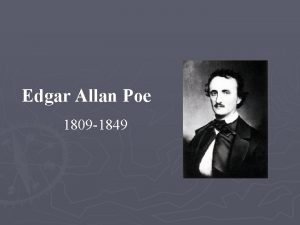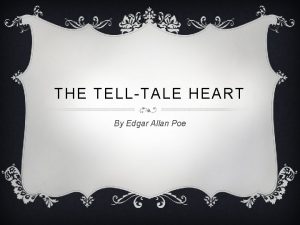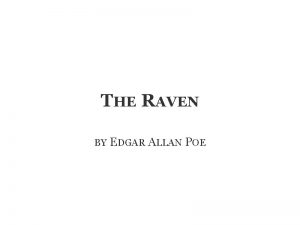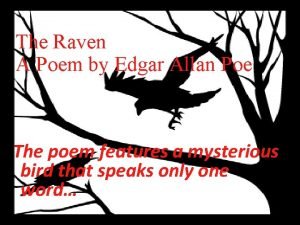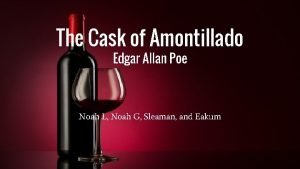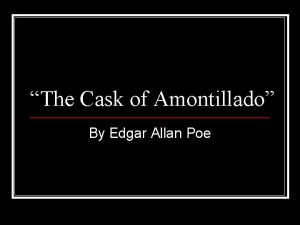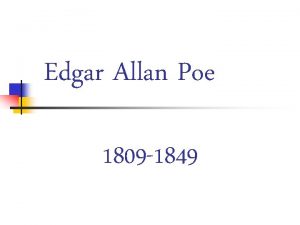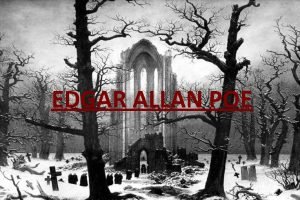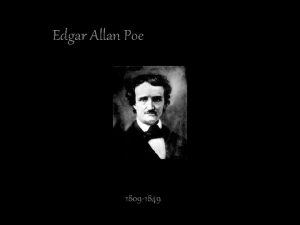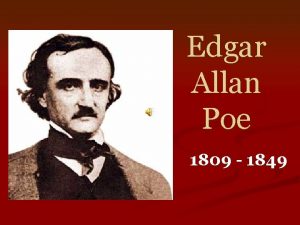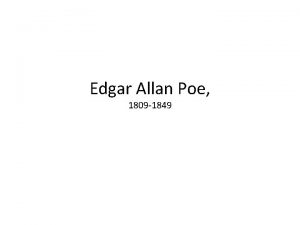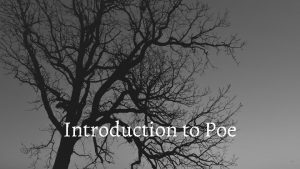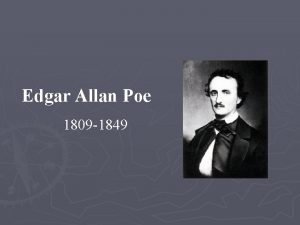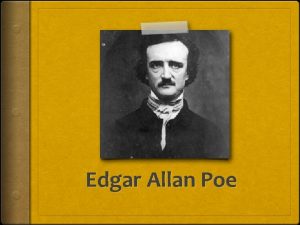Edgar Allan Poe 1809 1849 You have to











- Slides: 11

Edgar Allan Poe 1809 -1849

You have to wonder where some authors get their ideas or how their work relates to their own life, but you don't have to wonder with Edgar Allan Poe. • Early life and career Life and career • Military career • Publishing career Death Literary style and themes Legacy

Early Life • Poe born on January 19, 1809, in Boston, Massachusetts. • His mother, Elizabeth Arnold Poe, was a talented actress from an English theatrical family. • Poe’s father, David Poe, Jr. , a traveling actor of Irish descent, was neither talented nor responsible, the family suffered financially. • Elizabeth died in Richmond, Virginia, in 1811. • Young Edgar, though not legally adopted, was taken in by a wealthy Scottish tobacco exporter, John Allan, from whom Poe took his middle name. This plaque marks the approximate location where Edgar Poe was born in Boston.

1820 Poe moved back with the Allans to Richmond, Virginia 1826 He entered University of Virginia in February to study languages During his time there, Poe became estranged from his foster father over gambling debts and drinking issues. 1827 Poe gave up on the university after a year, he traveled to Boston in April, sustaining himself with odd jobs as a clerk and newspaper writer. 1827 Joined military- terrible soldier

• 1839 on- Poe published numerous articles, stories, and reviews, enhancing his reputation as a trenchant critic. He had worked as an assistant editor, a government post. Then he returned to New York, where he worked as an editor. • 1845 On January 29, his poem The Raven appeared in the Evening Mirror and became a popular sensation. It made Poe a household name almost instantly. • 1846 Poe moved to a cottage in the Fordham section of The Bronx, New York • Virginia died there on January 30, 1847. (TB) • Shortly after Virginia's death, Poe courted several other women including his childhood sweetheart, Sarah Elmira Royster. But all had no results. Poe Cottage

Death On October 3, 1849, Poe was found on the streets of Baltimore delirious, "in great distress, and. . . in need of immediate assistance", according to the man who found him, Joseph W. Walker. He was taken to the Washington College Hospital, where he died on Sunday, October 7, 1849, at 5: 00 in the morning

You have to wonder where some authors get their ideas or how their work relates to their own life, but you don't have to wonder with Edgar Allan Poe’s father abandoned the family His mother died when he was very young (TB) His foster father, John Allen, erratically swung between lenience and extreme discipline Adoptive mom, Mrs. Allan, died of TB. Poe married his much younger cousin Virginia who died at an early age. (TB) ……. Is it any wonder, then, that Poe's work focused on the macabre, the bizarre, and the outcast? No. The wonder is that he found a way to make such striking art from his suffering.

Literary style and themes Genres Poe's best known fiction works are Gothic, a genre he followed to appease the public taste. • recurring themes deal with questions of death, including its physical signs, • the effects of decomposition, • concerns of premature burial, • the reanimation of the dead, and mourning. Many of his works are generally Dark Romanticism genre, a literary reaction to transcendentalism, which Poe strongly disliked. Poe also wrote satires, humor tales, and hoaxes. For comic effect, he used irony and ludicrous extravagance, often in an attempt to liberate the reader from cultural conformity. Poe also reinvented science fiction, responding in his writing to emerging technologies such as hot air balloons in "The Balloon-Hoax".

Gothic fiction sometimes referred to as Gothic horror is a genre of literature that combines elements of both horror and romance. As a genre, it is generally believed to have been invented by the English author Horace Walpole, with his 1764 novel The Castle of Otranto Dark romanticism is a literary subgenre that emerged from the Transcendental philosophical movement popular in nineteenthcentury America. Works in the dark romantic spirit were influenced by Transcendentalism, but did not entirely embrace the ideas of Transcendentalism

Literary theory Poe's writing reflects his literary theories, which he presented in his criticism and also in essays such as The Poetic Principle. He disliked didacticism and allegory, though he believed that meaning in literature should be an undercurrent just beneath the surface. Works with obvious meanings, he wrote, cease to be art. He believed that quality work should be brief and focus on a specific single effect. To that end, he believed that the writer should carefully calculate every sentiment and idea. “The Raven”, he claims strictly followed this method.

Legacy Literary influence • The inventor of the detective story • The father of the modern American short story • The architect who helped the world discover science fiction as a literary genre • A skillful poet • An important literary critic who helped define American literature, film, and other arts
